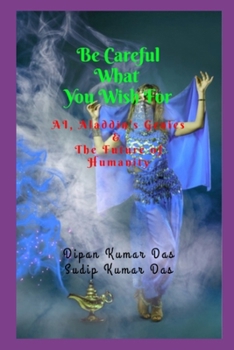Be Careful What You Wish for: Ai, Aladdin's Genies & the Future of Humanity
The timeless story of Aladdin's genie and its parallels to modern AI.
Why wishes are dangerous: unintended consequences.
Setting the stage: AI as humanity's genie.
Chapter 1 - The Ancient Myth of Genies and Wishes
Stories of djinn across cultures.
The symbolism of wish-granting powers.
How myths warned humans about greed, shortcuts, and hubris.
Chapter 2 - From Magic Lamps to Machine Code
The evolution of technology as humanity's new magic.
The Industrial Revolution → Digital Revolution → AI Revolution.
Why AI feels like a genie-immense power at our command, but unclear limits.
Chapter 3 - What Do We Wish For?
The deepest human desires: wealth, love, immortality, knowledge.
How AI promises versions of these (long life through medicine, wealth through automation, knowledge through instant answers).
The danger of wishing without foresight.
Chapter 4 - Misunderstood Wishes: The Problem of Alignment
Genie stories where wishes backfired.
AI alignment problem: getting machines to understand what we mean rather than what we say.
Examples: paperclip maximizer, misaligned incentives in real-world AI.
Chapter 5 - The First Wishes Already Granted
Social media algorithms (granting attention, but also addiction).
Recommendation engines (granting entertainment, but also isolation).
Chatbots and generative AI (granting knowledge, but also misinformation).
Chapter 6 - The Price of Power
Every wish comes with a cost.
Jobs, privacy, mental health, inequality.
The invisible bargains society makes when unleashing AI.
Chapter 7 - The Genie Without a Master
What happens when the genie stops obeying?
Autonomous AI, self-improving systems, superintelligence.
Can humanity remain in control?
Chapter 8 - Wisdom of the Old Tales
Lessons from Aladdin, King Midas, and Faust.
Ancient myths as warnings for modern technological ambition.
Why humility must guide innovation.
Chapter 9 - The Three Wishes of Humanity
What should humanity's "three wishes" be for AI?
A sustainable planet, fair opportunity, and deeper meaning.
How to word our "wishes" so they don't backfire.
Chapter 10 - Becoming the Masters of Our Own Lamp
Shifting from "wishers" to "builders."
Ethical design, regulation, and collective responsibility.
AI not as a genie, but as a partner.
Epilogue - The Future of the Lamp
The lamp is already open-there's no putting the genie back.
A final reflection: Be careful what you wish for... because the future depends on it.





